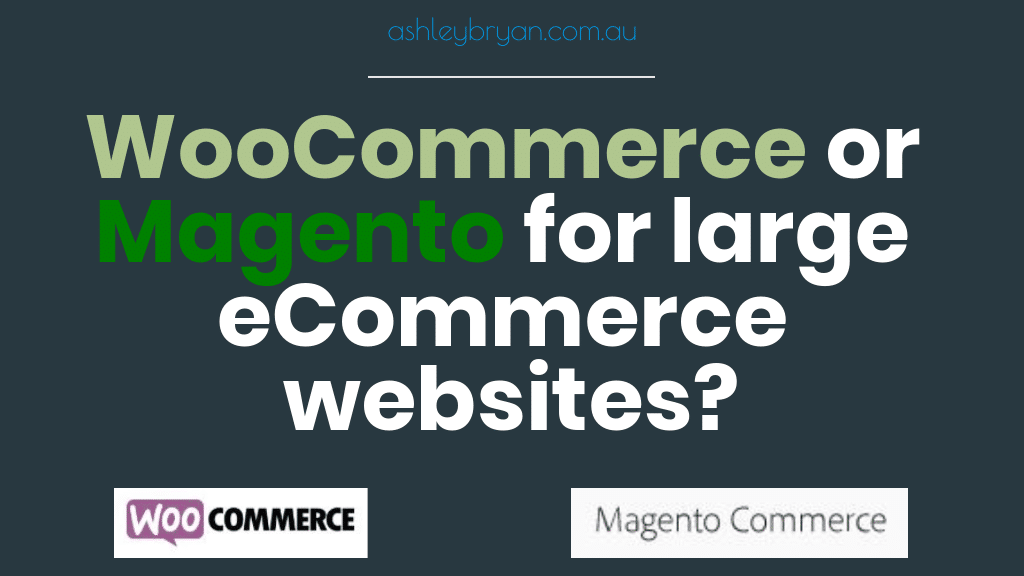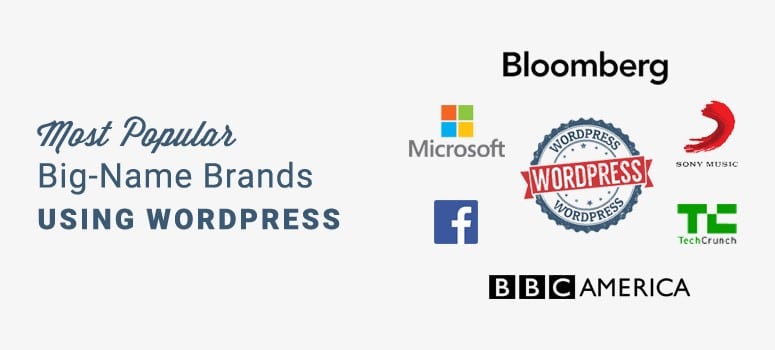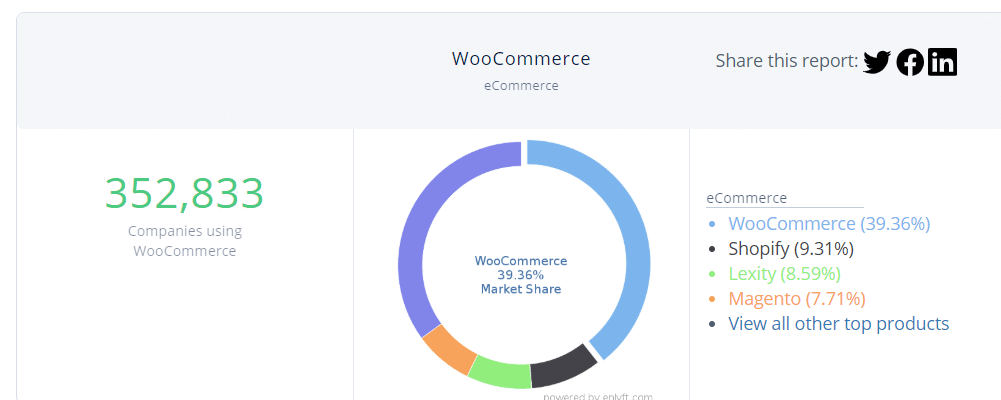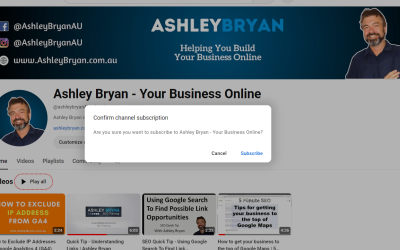Is WordPress/WooCommerce Suitable for Large Ecommerce Websites Or Is Magento Best?

For anyone thinking of starting an online eCommerce store to sell products, you’re naturally going to have some questions about the overall setup and the best platforms to use to build out your site. You will need:
- Site stability
- Fast web page loading speed
- An excellent user experience (UX)
- The ability to expand your website and product range as your business grows.
WordPress combined with the WooCommerce plugin is one of the most popular and simplest ways of creating an Ecommerce store, but can the WordPress/WooCommerce combination really handle large Ecommerce websites with loads of traffic and masses of products?
That’s one major question we’ll answer in this post along with a few other key things to keep in mind.
Make Important Decisions Before You Get Started
Whether you plan to hire a website developer or create the site yourself, you really need to put some thought and research in first before starting the website build. Using the best platforms, plugins and hosting right from the very beginning saves you the hassle of having to rebuild the site on a different platform down the track, or migrate your hosting to a new server.
You might even decide to get your entire site custom built. It’s really your choice, but it’s important to nail all this down from the beginning. Your web developer will know the best platforms upon which to build your site depending on your needs and how scalable your Ecommerce site needs to be, so it’s well worth collaborating with an expert.
Some Quick Information About WordPress
Roughly one third of all the websites you see online are built with WordPress. It’s a robust and trusted platform that also accommodates 1000s of different plugins so you can expand the functionality of your website – Ecommerce site or otherwise. This ability to choose from such a broad range of plugins (many of them free) is one of the key reasons why WordPress is, and always has been, so immensely popular.
When developers or webmasters create Ecommerce websites, generally the choice will be between either building the website on the Magento Ecommerce platform, or choosing to use WordPress with the WooCommerce plugin.
Let’s now see what WooCommerce and WordPress can handle when it comes to Ecommerce websites.

Source: https://www.isitwp.com/popular-big-name-brands-using-wordpress/
Off the shelf: WooCommerce or Magento?
- WooCommerce is an add-on to WordPress which is a blogging system (ie WordPress is really ideal for content-based websites with a secondary ecommerce requirement) whereas Magento is a dedicated ecommerce system with blog added on.
- Magento is preferred for very large websites but is more complex and expensive.
- WordPress is cheaper and allows for plugin management ie do it yourself.
- Important to have a dedicated Magento or WooCommerce developer for large scale websites.
- Both are mobile And SEO friendly.
For both WordPress and Magento, for large scale ecommerce websites:
- Dedicated hosting is recommended
- Developers should be experts in that platform
- Attention to caching is required to ensure sites peed
- CDN (images serviced from external server) is recommended – both support it.
How Many Products Can a WooCommerce Site Handle?
If you read up on WooCommerce, they claim that the sky is the limit when it comes to the amount of products you can host on a website powered by the Ecommerce plugin. While this may be true in essence, the ability for your website to be able to deal with large traffic volumes and loads of products also relies on some other key things:
- The quality of your website hosting
- Optimising WooCommerce for large scale sites
- Optimised custom codes
- Whether a CDN (content delivery network) has been employed
- Page loading speeds
- And more…
If your website’s content is image-heavy – which it very likely will be if you’re listing products to sell – then you’ll really want a CDN such as the Jetpack plugin installed on your WordPress site. What Jetpack does is host the images on an external server and delivers those images as required. Therefore, your website is really only having to serve up written content, meaning much faster load times and vastly improved customer experience. This is also great for SEO.
Harping back to the first section, this is one of the main reasons why it’s important to plan all of this out before you start putting your website together. If you believe your Ecommerce site will eventually host 100,000 products or more, it’ll need to be setup at the start to be able to cope with demand if you go the WooCommerce route.
WooCommerce can handle as many products as you might want to list, but some other factors come into play to help your site deal with delivery of so many products. While WooCommerce state you can host an infinite number of products, others speculate there may be a limit of around the one million product mark.
The website theme you choose can also play a role in how well your Ecommerce site performs regarding speed and stability. Complex themes can be slower even for basic websites, so choosing a simple theme with simple code will likely cause less of a bottleneck regarding product database size and heavy traffic volumes. There will also be less chance for glitches to occur when built with a more basic theme.
The Right Hosting Is Vital For Ecommerce Success
Just about any hosting company going around will be able to host your WordPress website, even if it has WooCommerce plugged into it. But not all web hosting companies are created equal and not all of the plans available are really suitable to hosting a large and popular Ecommerce store.
The cheaper shared hosting is generally okay for small websites and blogs, but if your goal is a large-scale Ecommerce website built with WordPress and WooCommerce, then you’ll really want to find a web host that offers quality dedicated WordPress hosting. This type of hosting is specifically designed for the WordPress platform and can handle large amounts of traffic, provide stability and can also help keep your site secure regarding transactions and product purchases.
Other Ecommerce Options
Along with WordPress/WooCommerce, you have the options of Magento, Shopify and BigCommerce to choose from for your Ecommerce site. Magento is great in that it’s an open source platform, which means the code is easily customisable. Magento is nowhere near as user-friendly though, so you’ll definitely want to enlist the help of a Magento web developer.

Source: https://enlyft.com/tech/products/woocommerce
Shopify and BigCommerce are robust Ecommerce platforms too, but these are integrated systems and you find yourself at their mercy if they decide to increase their fees. They’re also not very customisable and often not very SEO friendly. That’s not good for business.
What about a custom build?
In a Custom build the developer doesn’t use an off the shelf platform like WordPress or Magento, but instead builds the site from scratch and codes the entire thing themselves:
Pros
- You can get exactly what you want
Cons:
- More expensive usually
- You’re locked in with that developer, new developers will invariably declare it needs to be rebuilt
- No guarantee that their code is best practice, efficient and optimised/organised
- Every little change would cost money whereas off the shelf systems use plugins or extensions
- No official support, upgrades, patches etc
- No guarantees about SEO friendliness.
Conclusion
The answer to the initial question is yes, WordPress combined with WooCommerce and dedicated WordPress hosting is suitable for large scale Ecommerce websites, with loads of products and high traffic numbers. It’s still recommended to consult with, and have a web developer create the site for you.
Magento is an excellent alternative, but is more expensive and definitely requires the help of a Magento expert.
Both Magento and WooCommerce are well-suited to large scale Ecommerce websites.
Author: Ashley Bryan
Recent Posts
 Ashley’s Podcast
Ashley’s Podcast
- The TWO Reasons Why SEO Is Important - SEO Made Easy with Ashley Bryan [SHORT EPISODE] March 16, 2021
- The Importance Of Link Building For SEO February 1, 2021






